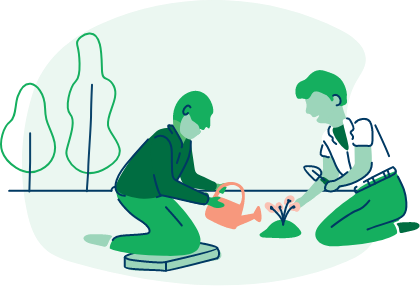Caregiver Burnout

Recognizing caregiver burnout
Every person has their limit – especially caregivers. The challenges and stress from providing unpaid care for another human being can build and build and, eventually, negatively affect the health of the caregiver. This is called caregiver burnout, and, like any illness, there are symptoms.
What is caregiver burnout?
Caregiver burnout is the state of physical, mental, and emotional exhaustion that can occur when a caregiver has reached their limit and does not have enough support, or a healthy way to deal with the stress. Caregiver burnout has three stages:
1. Frustration – The caregiver may get increasingly angry or impatient with a loved one’s deteriorating condition or their inability to juggle all the responsibilities of being a caregiver.
2. Isolation – As the stress and time commitments build, the caregiver may experience increased feelings of loneliness and may even withdraw further from social engagements.
3. Despair – The caregiver will feel helpless and depressed.
What causes caregiver burnout?
Often, a caregiver spends so much time and energy seeing to other people’s needs, that they neglect their own. In some cases, a caregiver may even feel guilty when and if they take time for themselves. But neglecting these basic human needs can result in burnout. Some of the other factors that can speed up the burnout process include:
— Role confusion – It can be difficult to be a caregiver while trying to be a good employee, spouse, parent, or friend.
— Unrealistic expectations – Sometimes, caregivers think that their presence will always have a positive impact on the person they’re caring for or that the act of caregiving will always feel fulfilling. Unfortunately, this isn’t always the case.
— Lack of control – It will sometimes seem like money is flying out the window. Free time may seem like ancient history. And, to make matters worse, every other person has an opinion on how things should get done. When all these things are happening at once, it can seem like your life is out of your control.
What does caregiver burnout look like?
If you or somebody you know starts exhibiting some of the following symptoms, then they may be suffering from caregiver burnout:
— Loss of interest in things that the caregiver used to enjoy
— Sudden emotional outbursts
— Problems at work
— Problems with a spouse
— Trouble sleeping
— Sudden change in weight
— Increased use of drugs or alcohol
— Difficulty concentrating
— Increased isolation
Do these symptoms sound familiar?
If these symptoms sound a little “too close to home” for you or somebody you know, then it may be time to get a little extra help.
